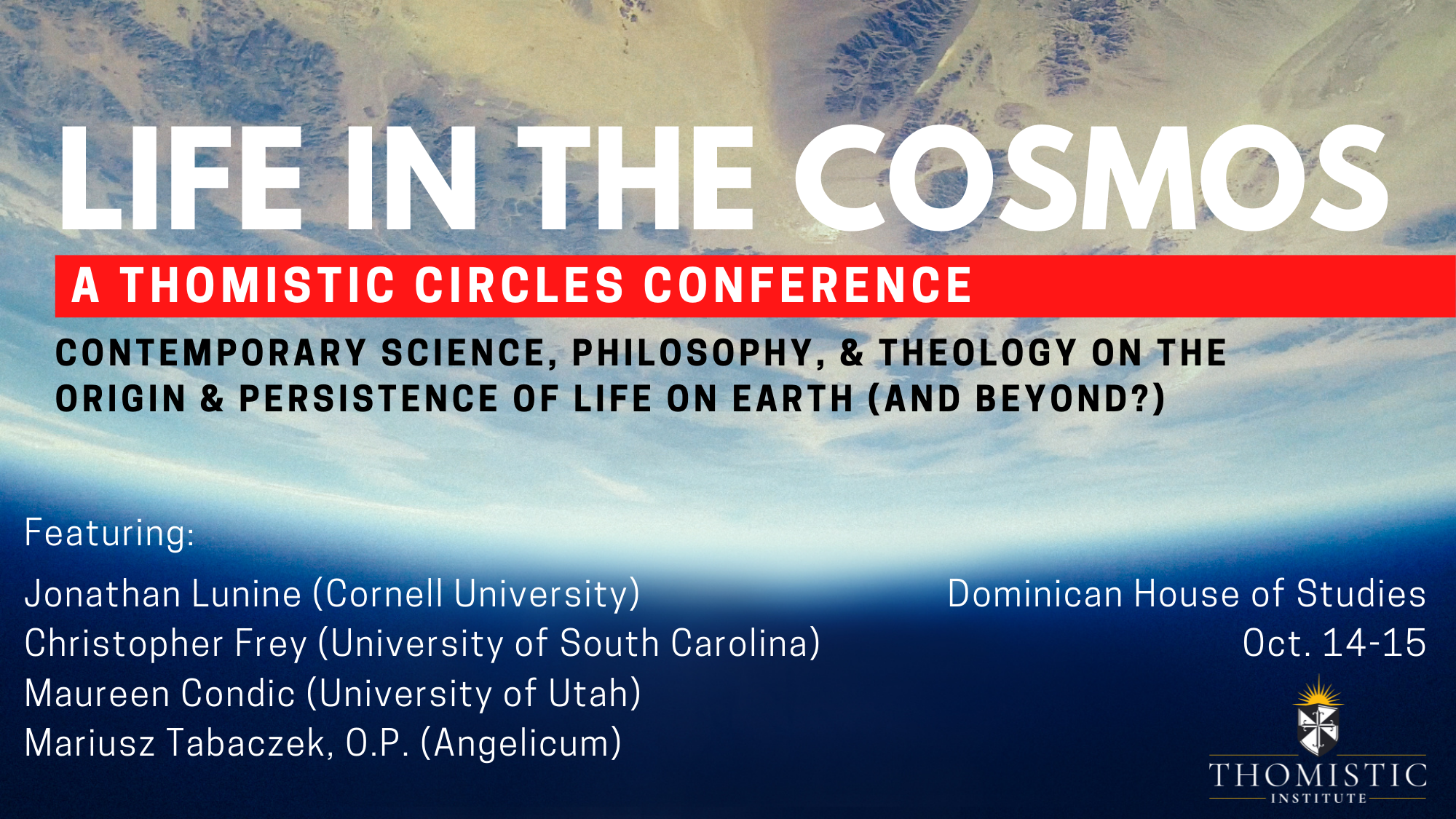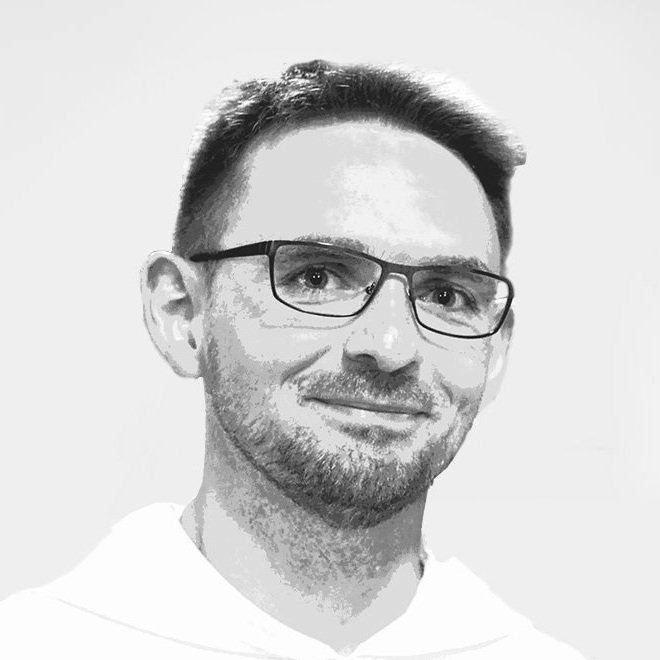For the Life in the Cosmos intellectual retreat (for current university students), go here.
Dominican House of Studies | Washington, D.C.
What is life? How did biological life arise? What makes life persist and might it exist elsewhere in the cosmos? What would that mean?
Consider these questions and more with the Thomistic Institute at the Fall Thomistic Circles conference, Life in the Cosmos: Contemporary Science, Philosophy, and Theology on the Origin and Persistence of Life on Earth (and Beyond?). The two-day conference at the Dominican House of Studies in Washington, D.C. features a stellar, cross-disciplinary lineup of speakers, scientists Jonathan Lunine (Cornell University) and Maureen Condic (University of Utah), philosopher Christopher Frey (University of South Carolina), and theologian Fr. Mauriusz Tabaczek, O.P. (Angelicum). The conference begins at 2:30 pm on Friday, Oct. 14 and concludes Saturday, Oct. 15 at 3:30 pm.
This conference is part of the Thomistic Institute’s Scientia Project.
What? A two-day conference on the origins and meaning of life considered from scientific, philosophical, and theological perspectives
Where? Dominican House of Studies (487 Michigan Ave. NE, Washington, D.C. 20017)
When? Friday, Oct. 14 at 2:30 pm - Saturday, Oct, 15 at 3:30 pm
Each talk concludes with time for Q&A. Light refreshments, including snacks and coffee, will be served between the lectures.
Current university students are invited to participate in a weekend-long retreat running concurrently with the Thomistic Circles. For more information and to apply, go here.
Featuring:
Prof. Jonathan Lunine (Cornell University)
Prof. Christopher Frey (University of South Carolina)
Prof. Maureen Condic (University of Utah)
Fr. Mariusz Tabaczek, O.P. (Angelicum)
Schedule
Friday
2:30 - 3:30 PM “Fertile Ground in Our Cosmic Backyard” by Prof. Jonathan Lunine
4:00 - 5:00 PM “Aristotle on the Impossibility of Defining Life” by Prof. Christopher Frey
Saturday
10:30 - 11:30 AM “The Origin of Life on Earth” by Prof. Maureen Condic
1:15 - 2:15 PM “The Phenomenon of Life and Its Origin” by Fr. Mariusz Tabaczek, O.P.
2:30 - 3:30 PM Quodlibetal Panel
About the Speakers
Jonathan I. Lunine is The David C. Duncan Professor in the Physical Sciences at Cornell University and Director of the Cornell Center for Astrophysics and Planetary Science, His research focuses on astrophysics, planetary science and astrobiology. In addition to his responsibilities in the classroom, he serves as Interdisciplinary Scientist on the James Webb Space Telescope project and is a coinvestigator on the Juno mission currently in orbit around Jupiter. Lunine is a member of the U.S. National Academy of Sciences, a fellow of the American Geophysical Union and the American Association for the Advancement of Science. He is the 2014 recipient of the Jean Dominique Cassini Medal of the European Geosciences Union. He is the author of Astrobiology: A Multidisciplinary Approach and Earth: Evolution of a Habitable World. Lunine obtained a B.S. in physics and astronomy from the University of Rochester (1980), an M.S. (1983) and a Ph.D. (1985) in planetary science from the California Institute of Technology. He lives in Ithaca New York, where he is a member of St. Catherine of Siena parish. In 2016 Lunine helped to found the Society of Catholic Scientists.
Christopher Frey is an associate professor in the department of philosophy at the University of South Carolina. Prof. Frey works primarily in Ancient Greek philosophy, especially Aristotle’s natural philosophy and metaphysics. He is writing a book entitled The Principle of Life: Aristotelian Souls in an Inanimate World. It concerns the distinction between the animate and the inanimate, the unity of living organisms, nutrition, birth, death, and, more generally, what one’s metaphysical worldview looks like if one takes life to be central. He also works in contemporary philosophy of perception and mind and has written extensively on the relationship between the intentionality and phenomenality of perceptual experience. In addition to these two main areas of research, he has secondary projects in metaphysics, the philosophy of action, Medieval philosophy, Early Modern philosophy, and the history of analytic philosophy.
Maureen Condic is an Associate Professor of Neurobiology and Anatomy at the University of Utah School of Medicine, with an adjunct appointment in the Department of Pediatrics. Since her appointment at the University of Utah in 1997, Condic's primary research focus has been the development and regeneration of the nervous system.
Condic’s current research involves the control of human stem cell potency and differentiation. In addition to her scientific research, she teaches both graduate and medical students. Her teaching focuses primarily on embryonic development, and she has taught Human Embryology in the University of Utah School of Medicine’s curriculum for over 20 years.
In 1999, Condic was awarded the Basil O'Connor Young Investigator Award for her studies of peripheral nervous system development. In 2002, she was named a McKnight Neuroscience of Brain Disorders Investigator, in recognition of her research in the field of spinal cord repair and regeneration.
Condic recently authored the book, Untangling Twinning: What Science Tells Us about the Nature of Human Embryos. She also co-authored Human Embryos, Human Beings that explores the nature of the human embryo from a scientific and philosophical perspective.
Condic is a member of the National Science Board’s class of 2018-2024.
Mariusz Tabaczek, O.P. is a Polish Dominican and theologian. He holds a Ph.D. in philosophical theology from the Graduate Theological Union in Berkeley, CA and a Church Licentiate from the Adam Mickiewicz University in Poznan, Poland. After his studies at the GTU and a fellowship at the Notre Dame Institute for Advanced Studies, he returned to Poland.
For three years he worked as a researcher at the Thomistic Institute in Warsaw, a lecturer at the Pontifical Faculty of Theology in Warsaw and the Dominican School of Philosophy and Theology in Krakow, and a director of the Studium Dominicanum in Warsaw. He then moved to Rome where he serves as a professor of theology at the Angelicum and a researcher for the Thomistic Institute Angelicum.
He is interested in the science-theology dialogue, especially in the issues concerning science and creation theology, divine action, and evolutionary theory. His research also goes to other subjects related to systematic, fundamental, and natural theology, philosophy of nature, philosophy of science (philosophy of biology, in particular), philosophy of causation, and metaphysics. His works address a whole range of topics, including: the notion of species, metaphysics of evolutionary transitions, concurrence of divine and natural causes in evolutionary transitions, definition and role of chance and teleology in evolution, classical and new hylomorphism, classical and contemporary (analytical) concepts of causation, emergence, science-oriented panentheism and its critique, and various aspects of divine action in the universe.
He published a number of articles on metaphysics and the issues concerning the relation between theology and science in Zygon, Theology and Science, Scientia et Fides, Nova et Vetera, Forum Philosophicum, American Catholic Philosophical Quarterly, Sophia, and Polish Annals of Philosophy. He coauthored two chapters in the second edition of Science and Religion: A Historical Introduction (ed. by Gary Ferngren) and has written the entry on “Emergence” for the PalgraveEncyclopedia of the Possible. He is also the author of two monographs. The first, entitled Emergence: Towards A New Metaphysics and Philosophy of Science, was published in 2019 and was announced as one of the best metaphysics books to read in 2019 by Bookauthority. The second book, Divine Action and Emergence: An Alternative to Panentheism (published in 2021), offers a critical analysis of the theory of divine action based on the notion of emergent phenomena and provides a constructive proposal of a theological reinterpretation of divine action in emergence from the point of view of the Aristotelian-Thomistic tradition of philosophy and theology.
About Thomistic Circles
About Thomistic Circles: Our Thomistic Circles Conferences at the Dominican House of Studies in Washington, D.C. bring together prominent professors (principally in theology and philosophy), graduate students, seminarians, and Dominican brothers to provide a forum for examining contemporary questions from the perspective of classical Catholic theology, and to encourage the renewal of theology and philosophy in the Thomistic tradition.
These conferences are distinctive not only because of their academic quality, but also because they take place in the context of a vibrant Dominican studium and religious community. As befits the Dominican tradition, the serious study of theology and philosophy is integrated with the contemplation of the mysteries of the faith.
Thomistic Circles have been held under the auspices of the faculty at the Dominican House of Studies (founded in Washington, D.C. in 1905) for most of its history.





